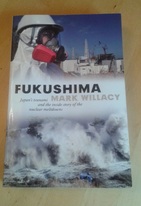 Fukushima - Mark Willacy
Fukushima - Mark Willacy The book entitled “Fukushima” is a piece of investigative journalism around the Fukushima nuclear disaster that followed the earthquake and tsunami in March 2011.
Willacy interviews survivors who lost loved ones, people that worked at the nuclear plant before, during and after the reactor meltdowns, scientists and even leading politicians of the time. The story that is told is poignant, important, worrying and ultimately depressing – whilst the earthquake and subsequent tsunami were unavoidable, the resultant nuclear disaster could have been much less significant.
Willacy lays bare the collusion between the Japanese government, the nuclear industry and the nuclear regulators that resulted in commercial considerations being put before matters of safety. The cataclysmic tsunami had been researched and predicted by the scientific community but the nuclear industry trashed the findings and then didn’t act on any of the recommendations for safety improvements.
At the time of the meltdowns, the reactions of the Fukushima plant owners were inadequate, information wasn’t shared in the way it should have been and innocent citizens were exposed to dangerous levels of radiation.
The plant managers, admittedly under massive pressure and acting without full information, made some bad decisions that made some things worse.
After the events, colluding parties tried to hold back essential information because of fears of causing public panic or galvanising legal action from those affected.
Since 2011, a variety of rules with regards to safe levels of radiation exposure for Japanese citizens have been revised upwards so that the true impacts of the disaster seem less worrying.
I have written about Fukushima before - http://www.adrianbaldwin.net/blog/fukushima-the-stuff-of-nightmares - have a read of the post to save me repeating some of my earlier comments.
The financial and moral/ethical corruption that Willacy exposes in Japan should bother you because the issues could so easily affect the UK too. If the Chinese (CGN) and the French (EDF) decide to go ahead with Hinkley Point C, then what’s to say that corners wouldn’t be cut all over the place in the quest to make money. Our government has already had to agree to future electricity price fixing in order for the consortium to get as far as it has with its deliberations to invest or not. And I’d bet my own hard-earned-cash that whatever project costs the stakeholders anticipate will be under-called; and the need to make a profit will be even more of a driver.
In Japan, the general public was brainwashed for decades that nuclear power was safe. And I guess it is…
…until it isn’t.
And it’s the “isn’t” that needs plenty of thought.
On top of the fallibility of the management/workers, there is the short-termism of global stock markets, then there is the power of Mother Nature to contend with, and of course there’s terrorism or war. If the catastrophe in
Fukushima had escalated (more meltdowns, hydrogen explosions – and there was significant risk of both) then Japan could have ceased to function as a country.
On a separate but related matter, I watched Paul Merton’s “Secret Stations” a week or two ago. He visited Drigg Station, Cumbria. That request stop station is associated with the nuclear industry in the UK. Merton was taken around a low level nuclear waste storage facility (serving Sellafield) and when I saw the scale of the site and the number of shipping containers of waste, I was unnerved.
The reason for digressing is that the risks associated with nuclear power are broad; for us in the UK, Cumbria experiences seismic activity quite regularly. Whilst the UK is not in the “ring of fire” something could just as easily occur in our backyard. And it might not even start with a reactor failure, it could start with a failing in what amounts to a storage yard.
Willacy’s book is well worth a read, it is carefully, and cleverly, written so that the science, nuclear physics and political contents are wrapped around true stories of human suffering and incredible endeavour. It’s moving, it will make you sad, it will make you angry and it will make you shake your head in disbelief.
My last point was going to be – go and buy yourself a copy – but a quick Amazon search has proved that might not be so easy – unless you have a Kindle.
The book is published by Pan Macmillan Australia and isn’t available as a hardcopy from Amazon UK. My copy has an Aussie RRP of A$32.99 so there is clearly a story surrounding how it ended up in the Newport Pagnell charity shop where I bought it…for 75p. Mine is signed by the author and has a dedication “To Dad, …love from Lulu”.
And the message is kind of appropriate because the next person that will read this book will be my dad.
Blog Home
Blog Library
Home
 RSS Feed
RSS Feed
